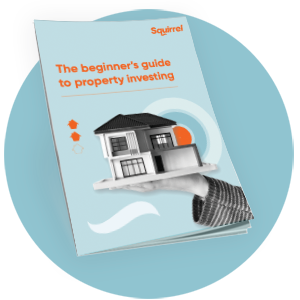Build your nest egg by investing in property
Owning investment property isn't like winning lotto. The not-so-secret truth is that investors put a lot of energy into making their portfolio work for them.
Having the right advice and strategy is key. Whether you're just starting out or a seasoned investor, we're here to help.
Get started Download our handy guide


Why talk to Squirrel about investing in property?
It’s hard to play a game where the rules change as often as the weather, so keeping up with any credit policies is crucial. We keep our paw on the pulse and whether you're just starting out or looking to expand your empire (evil or otherwise), with Squirrel you'll get:
- Better mortgage rates
- Advice from experienced property experts
- More options with access to bank and non-bank lending
- Support if things don't go your way
Not sure where to begin? Download the ultimate guide to investing in property

Expert advice
Our team of experts have first-hand experience in property investing, and love chewing the fat about property.

More lending options
Part of what makes us unique is we've got relationships with all the major banks, non-banks, and access to over 5,000 P2P lenders. More options means a better deal.

Unbiased, personalised advice
Our Mortgage Advisers are paid the same regardless of which lender they recommend, so the only motivation they have is to make you better off.

Save money
Having the right investing strategy can save you a packet. It costs nothing to sit down with us, come up with a plan and bounce ideas around.
More lenders, more choice and a better deal
PLUS a network of over 5,000 peer to peer lenders
Not only do we have access to more banks than other brokers, but we have a community of over 5,000 peer-to-peer lenders for a custom solution if you don't quite fit the bank's box.
Is your bank still the right fit for you?
Traditionally, going to the main banks for lending has always been a no-brainer. But fitting into the 'bank's box' and accessing their funds has become trickier over time.
New Zealand has lots of well-established non-banks that are hugely market competitive, more approachable and more open to lending.
Their interest rates may generally be higher, but under current credit conditions, investors must understand that accessing money is going to come at a slightly higher cost.

Starting out
Everyone has to start somewhere, so rather than launching straight into building a 5-storey apartment block complete with underground parking and tennis courts, it's smarter to start out a bit smaller and closer to home.
Will your house make a good rental?
Making this decision should be based on some goals and a good strategy. Ask yourself honestly: does my house fit the bill? Is it likely to yield good results or go up in value? If the answer is no, then you’re better off selling up and using the money to buy a better investment.
Converting your home into an investment property
When you buy a new home, you might want to keep your old place as a rental. Since there are significant costs to buying and selling, this can make good sense – but only after you’ve answered a couple of key questions.
Home and Income
A granny flat under your house can be an easy way into property investment. They make sense on so many levels and can also help you buy in an area you might not otherwise afford. It’s a great idea to look for actual grannies to live in your granny flat. They tend to value the security of having a family close by, are reliable and quiet and much more tolerant of family noise than other types of tenants. Good old nan.
Work towards strong capital growth
Don’t rely on the market to push the value of your properties up. You need to add value to your properties so you have more equity to borrow against.
Choose equity over rent
Sacrificing higher rents in the short term can be a hard decision, but it’s much smarter to invest in a lower quality property where you can own more equity.
Get rid of non-standard properties
These are apartments of less than 45sqm and properties with more than 3 incomes. Get rid of them, even if they’re cheap and give you good rents; banks will typically only lend up to 70% of their value, so they’ll hold you back from borrowing what you need.
Do I have the right tax structure?
The debt on a rental is tax deductible so you’ll want to put as much into your investment property as possible. The way to do this is to sell your existing home to a Look Through Company or an LTC, which you own. The LTC buys the home at a fair market price and then borrows 100% against it. You then provide a personal guarantee to the lender using your new property as additional security.
You use the proceeds of the sale to clear the mortgage on the old property and put any extra into your new home. In this way you can move the equity from your old property to your new home.
What's happening with interest rates?
Mortgage interest rates seem to change with the wind so it pays to stay up to date. Because when we’re talking hundreds of thousands of dollars, a fraction of a percent change in interest or repayment rates can save you a packet. This could mean retiring to your super yacht a few years earlier than planned.

Stay on top of the latest
Before you get carried away with visions of taking over the world, soak up all the knowledge you can (and impress your friends with how clever you are).
All articlesMarket update: Economic pain will be borrowers’ gain (eventually)
New Zealand economic data has painted a pretty sorry picture in recent months. But bad news for the economy will eve...

Housing shortage worries? Not yet
The toilet paper shortage crisis is over — but is it turn for housing shortages in New Zealand?
What is the Official Cash Rate, exactly?
Put really simply, the Official Cash Rate is the interest rate that the banks earn on any money they’re holding with...

Property Development - doing a subdivision
The most logical place to start when dipping your toes into the property development space is subdividing a property. But although it might be a logical place to start, it’s not going to be easy or cheap. We share our tips and valuable lessons from the University of Life below.
Subdividing a property is a great way to instantly add value, but it’s expensive.
Councils will see you as a way to cover their budget shortfall with a “development contribution.” These fees average around $20,000 per dwelling. Councils will also sting you with a bunch of compliance-related costs. In Auckland, for example, you’ll pay about $7,000 per dwelling just to connect the water.


What’s involved in subdividing a property?
To subdivide a property, first you need to:
- understand what you can and cannot do according to council zoning rules
- do a land survey.
When looking at a property you could subdivide, consider:
- How steep is the section?
- Is the section in the front or back? If it’s on a back section, how long is the drive?
- Is the place you’ll have to dig on rock or soil?
- Is there already drainage, water, storm water and power nearby?
Learn from our experience
We don't just sit here and tell other people what they should do; there are a few seasoned investors within Squirrel, the obvious one being Squirrel founder, JB. Watch this 5 part series about his experience of moving a house (literally picking it up and moving it to another location), why he did what he did and what he learnt.
Chapter 1: Why Hendon Ave?
Chapter 2: About the Site:
Chapter 3: Building vs relocating
Chapter 4: The Ideal Tenant
Chapter 5: Where and what kind of subdivision?







